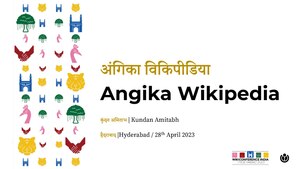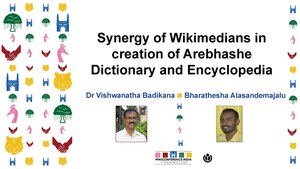There Shall Be Seasons Refreshing – Stories from WikiConference India 2023
The clouds had set in, the cold breeze also joined and then came the pleasantful showers. Hyderabad is located on the very hot and dry Deccan plateau. Here, April is a time of summer heat, but all of nature just joined to make the 3rd edition of WikiConference India in Hyderabad this April an exciting, enriching and enhancing experience. For the languages and communities in India and its subcontinent, the seven-year wait to host another national conference and the challenges of the Covid pandemic all stood down, giving way to the drama of dedication, determination and deliverance by the communities.
Technologies are often said to solve every problem ... If so, learn about the Kashmiri Wikipedia's story. Keyboards don't support all characters, machine translation is still sub-par, little digital content on the internet. That's not all – the scenic, beautiful high-altitude mountain state of Kashmir where the language is native has internet shutdowns. Yet, Kashmiri Wikipedia never disappoints. The content is growing, and so is the readership and editor base. User:Amire80 and the larger language community also helped to get the Universal Language Selector working. Let there be problems, User:511KeV and the larger Kashmiri community will always find solutions and make a bigger history someday. The challenges will be overcome, so mark this space.
Listen to some more! Angika is a language spoken in Bihar, Jharkhand, West Bengal and parts of Nepal. If India falls under Global South, these regions are further south amongst the Global South. The language was in incubation for nearly twelve years and only went live on 22 March, 2023. Can a twelve-year wait be imagined? That's the art of resilience, which is almost a curiosity for today's generation of volunteers. As machine learning, automation and faster technological solutions became ever more commonplace in the movement, the word 'resilience' began to disappear. User:Angpradesh and the larger Angika community have shown the willingness and commitment to defy the odds and succeed. Meanwhile, Gondi, Kolami and many other languages are also writing their history and expect to succeed very soon.
While Angika work stretches back to the first WikiConference in 2011 and before, learn about Mr Bharathesha Alasandemajalu and Dr Vishwanatha Badikana who made Tulu Wikipedia active around the time of WikiConference India 2016 in Chandigarh. This time they came with even more exciting developments. Heard of Arebhashe? A dialect of Kannada having a history of more than 500 years. On invitation from Karnataka State Arebhashe Samskrithi Mattu Sahitya Academy, they have set up the first-ever lexicon of 18,000 words in 950 pages, as well as the first-ever encyclopedia of about 450 pages and still counting. This is a remarkable achievement for an endangered and underrepresented language, and you can read more about the story behind it here.
There are more stories to hear, there are more stories to appreciate. Doteli is one, Santali is another. Wikisource in India has its own fairytale from stories on digitization to audio books to new technologies. The writing space will fall short, the time space will be limited but the stories will not finish. These are communities from India and its subcontinent.
It is the same community who suffered the worst of the Covid pandemic and asked for help with vaccination, protection kits and expert counselling. The very same community which repeatedly has hardware and bandwidth challenges. What did some of these and others stories show at WikiConference India 2023? The challenge may be any, hard or soft, it is the communities who always make the difference. There are no two ways about it, communities in the Indian subcontinent will continue to rise.






Discuss this story